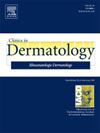Artificial intelligence in dermatology: Bridging the gap in patient care and education
IF 2.2
4区 医学
Q2 DERMATOLOGY
引用次数: 0
Abstract
The application of artificial intelligence (AI) in education and clinical medicine has shown tremendous growth. The primary explanation for this application is AI's ability to integrate efficient and tailored methods for screening, using diagnostics, and enhancement of patient and medical education. AI's wide scope of utility can be seen through its ability to improve efficiency in clinical settings through scheduling, charting, diagnostics, and screening tools, ultimately allowing physicians to spend more focused time on patient care. AI has also had a tangible impact on promoting patient education through its ability to provide patients with preliminary information regarding their diagnoses before followup and to further discussion with their physician. AI's application in medical education is promising due to its ability to provide immediate and interactive feedback to the learner, which allows for meaningful reinforcement of knowledge. AI can therefore be recognized as a tool that can provide incredible enhancement in the areas of clinical medicine and education, with meaningful opportunities for integration and application.
皮肤病学中的人工智能:缩小患者护理和教育方面的差距。
人工智能(AI)在教育和临床医学中的应用呈现出巨大的增长势头。这种应用的主要原因是人工智能能够整合高效和量身定制的筛查方法,利用诊断以及加强患者和医疗教育。人工智能的广泛实用性体现在它能够通过日程安排、制表、诊断和筛查工具提高临床环境的效率,最终使医生能够将更多的时间集中在病人护理上。人工智能还能为患者提供有关诊断的初步信息,从而在后续治疗和与医生进一步讨论之前,对促进患者教育产生切实影响。同样,人工智能在医学教育中的应用也大有可为,因为它能够为学习者提供即时和互动的反馈,从而对知识进行有意义的强化。综上所述,可以认为人工智能是一种可以在临床医学和教育领域提供令人难以置信的增强功能的工具,并提供有意义的整合和应用机会。
本文章由计算机程序翻译,如有差异,请以英文原文为准。
求助全文
约1分钟内获得全文
求助全文
来源期刊

Clinics in dermatology
医学-皮肤病学
CiteScore
4.60
自引率
7.40%
发文量
106
审稿时长
3 days
期刊介绍:
Clinics in Dermatology brings you the most practical and comprehensive information on the treatment and care of skin disorders. Each issue features a Guest Editor and is devoted to a single timely topic relating to clinical dermatology.
Clinics in Dermatology provides information that is...
• Clinically oriented -- from evaluation to treatment, Clinics in Dermatology covers what is most relevant to you in your practice.
• Authoritative -- world-renowned experts in the field assure the high-quality and currency of each issue by reporting on their areas of expertise.
• Well-illustrated -- each issue is complete with photos, drawings and diagrams to illustrate points and demonstrate techniques.
 求助内容:
求助内容: 应助结果提醒方式:
应助结果提醒方式:


